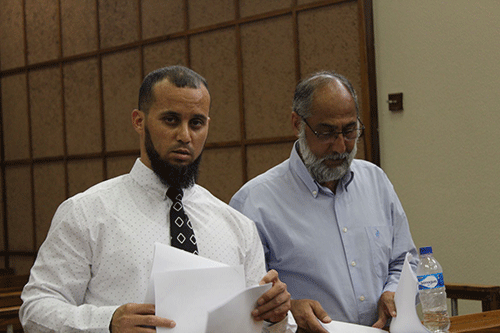State advocate Timo Itula on Friday asked Windhoek High Court Judge Orben Sibeya to sentence drug dealers Grant Noble and Dinath Azhar to the maximum allowed under the Drugs Act, namely 15 years direct imprisonment.
Noble (36) and Azhar (62) were convicted on one count of dealing in cocaine. They are also charged with one count of money laundering, but were acquitted on that charge as the judge found it constituted a duplication. They were arrested on 15 June 2018 after a container they imported was found loaded with 412kg of cocaine worth an estimated N$206 million.
“The court should not be deterred from handing down a sentence which is deterrent, preventative, reformative and retributory,” Itula argued.
According to Itula, society must be protected from people such as the accused therefore the court must send out a clear message that drug smuggling will not be tolerated. The mere volume of the drugs involved – more than 400kg – would have had a devastating effect if it was let loose on society, Itula stressed. He further said the duo did not show any remorse for their conduct and any plea for clemency on the basis of remorse should be seen for exactly what it is, a ploy clearly aimed at evoking sympathy from the court.
According to Itula, the convicts opted not to testify in mitigation, thereby not taking the court into their confidence and any attempt from the defence counsel to proffer remorse from the bar should be disregarded. He further said that it is unknown if any kind of punishment will rehabilitate the accused persons, but what is certain though, is that if they become rehabilitated in prison, they might qualify for a reduction in sentence.
Defence lawyer Mbushandje Ntinda, standing in for Sisa Namandje, argued that the pre-conviction incarceration of the accused should be seen as punishment enough. According to him, the court should impose a fine of N$20 000 on each accused with an option of two years imprisonment on failure to pay the fine plus an additional wholly suspended five years imprisonment term. This he said would guarantee that the accused refrain from committing similar offences. He further argued that the judicial system has moved away from the “backwards-looking retribution theory of sentencing which is associated with revenge as a justification for punishment, and which is deeply ingrained in human experience. Therefore, he said, courts are reminded and cautioned not to deploy a sentencing mind which goes back as far as the dictum of an eye for an eye, a tooth for a tooth and a life for a life.
He further asked the court not to declare the boxes of copy paper found in the container forfeited to the State as the accused persons plan to start a business selling those when released from prison. Itula on the other hand argued that the copy papers were the means used by the accused to import the drugs in the container.
He said the drugs were concealed in the same type of boxes the papers were in and that it would fly in the face of the judge’s ruling that states that the copy papers were used as a disguise and that the two men used their business entity – Zeeki Trading – as a front to smuggle drugs into Namibia from Brazil.
Judge Sibeya indicated that he will deliver his sentence on 6 October.
The accused are in custody at the Windhoek Correctional Facility’s section for trial awaiting inmates.
– rrouth@nepc.com.na



